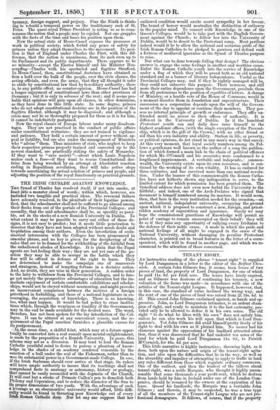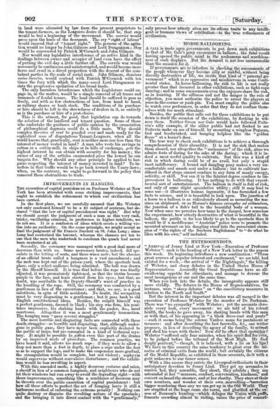TENANT RIGHT.
Ax instructive reading of the phrase "tenant right" is supplied by Lord Dungannon in a letter to the editor of the Belfast Chro- tuck. A certain John Gilmore has, it seems, been lessee of two pieces of land, the property of Lord Dungannon, for one of which he paid us. 9d. per huh acre. The leases have lately expired, and as Gilmore was desirous of continuing his tenancy, a new valuation of the farms was made—in accordance with one of the articles of the Tenant-right League. It happened, however, that, in this ease, the standard of value inclined the wrong way, and the rent of one of the pieces of land was raised from 2/. 1138. 44. to 5l. This award John Gilmore exclaimed against, as harsh and op- pressive. John, as Lord Dungannon intimates is an ardent cham- pion of right, and ready to maintain it to the last extremity, pro- vided only he be allowed to define it in his own sense. The old right "to do what he likes with his own" does not satisfy him, unless he can also work his Will upon that which is Lord Dun- gonnon's. Yet John Gilmore did avail himself pretty freely of his right to deal with his own as it pleased him. No sooner had his clamours against the oppressions of his landlord attracted atten- tion, than it was discovered that he had underlet ten acres of the land for which he paid Lord Dungannon 1 la 9d., to Patrick lif`Cormick, for 468. 4d.. per acre.
This little narrative is highly instructive; throwing light, as it does, both upon the nature and origin of the tenant-right agita- tion, and also upon the difficulties that lie in the way, as well as the absurdity and impolicy of attempting to apply to traffic in land any rules different from those which regulate ordinary commerce. One of the earliest, and then the loudest of the talkers about tenant right, was a noble Marquis, who thought it highly unrea- sonable that some thousands a year profit-rent, which he derives from lands held by him in Ireland under one of the London Com- panies, should be resumed by the owners at the expiration of his lease. Quoad lies landlords, the Marquis was a veritable John Gilmore ; and therein, it may be suspected, he was a true type of all the members of the Tenant-right League who are not pro- fessional demagogues. It follows, of course, that if the property in land -were alienated by letw frem the present proprietors to
the tenant-farmers, as the desire it should be, that step would be but a be of theinoyement. The ouvrier would press upon the h of. bourgeois. The cry "right of labour" would succeed that of "tenant right." The persons of the agita- tion would no longer be John Gilmore and Lord Dungannon ; they would be superseded by Patrick M'Cormick and John Gilmore.
Nor would any legislative interference of an active kind in the dealings between owner and occupier of land even have the effect of putting the evil day a little further, off. The servile war -would necessarily be centinuous and uninterrupted, and would become more fierce and cruel in a direct proportion with the descent of the com- batant parties in the scale of social rank. John Gilmore, dominus unius lacerke, would contend with Patrick 11PCormick with ten times the fury with which the many-acred Lord Dungannon re- sists the progressive spoliation of his broad lands.
The only harmless interference which the legislature could en- gage in in the matter, would be a simple removal of all traces and trammels of feudal tenure. The land should be suffered to pass as freely, and with as few obstructions of law, from hand to hand, as railway shares or bank stock. The conditions of its purchase or hire should be left to the shrewdness of dealers in it, as entirely as is the purchase or hire of a post-chaise. This is the utmost, for good, that legislation can do towards the solution of the landlord and tenant question. Some of those who undertake the guidance of public opinion by the enunciation of philosophical dogmata could do a little more. Why should complex theories of rent be puzzled over and made ready for the sophistical uses of disputatious Tenant-Leaguers, when all the world knows that, practically, rent is neither more nor less than the interest of money vested in land? A man who vests his savings in cotton or a cotton-mill, in ships or in bills of exchange, gets the highest interest he can obtain with security for his money.; the owner of any of the articles enumerated glees the lowest he can bargain for. Why should any other principle be applied to bar- gains respecting the interest of money invested in land? To in- terfere in that traffic would be to go back toward the ITiinv-laws ; when, on the contrary, we ought to go forward in the policy that removed those obstructions to trade.



























 Previous page
Previous page